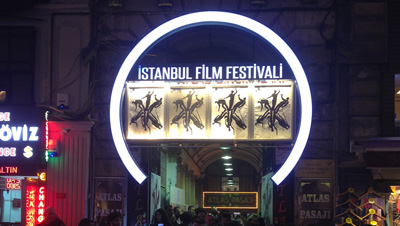
- Industry
The 33rd Istanbul International Film Festival
The 33rd edition of the Istanbul Film Festival showcased more than 200 films in over 20 different categories from April 5-20 in the Turkish city. Turkish Cinema is celebrating its 100th anniversary this year and the festival paid tribute with a series of panels devoted to different genres including documentaries, drama, horror as well as Q&As with filmmakers and crews alongside production and distribution meetings such as the traditional “Meetings on the Bridge” panel. One particularly lively debate took place at the Istanbul Modern Museum on the subject of what is understood by “political cinema,” the issue was mainly addressed through Kurdish cinema, always a festival staple.
Another frequent component of this festival at the crossroads of Europe and Asia is Greek cinema by virtue also of the historic Greek population of the city, and this year was no exception, beginning with Miss Violence, from director Alexandros Avranas, who talked about the state of Greek cinema in the context of the difficult crisis traversed by his country: “There are labels of Greek cinema and labels by critics. New movements in film are present in every part of the world, not just here. I don’t really care what they say. I just told a story by focusing on family to explain the society I am in. Greece has sunk, we can’t get up, and the enemy isn’t visible.” Another, more sombre anniversary observed at the festival this year was the commemoration of the start of World War I, 100 years ago. The IFF – which after all takes place only a few miles from the battle fields of Gallipoli – presented a section called ‘Building a Nation Through Cinema,’ where film critic Rüdiger Suchsland’s documentary Caligari – Wie der Horror ins Kino kam / Caligari, When Horror Comes To Cinema was shown. At the panel discussion, attended by film critic Engin Ertan and Rüdiger Suchsland following the screening, Suchsland underlined how artistic movements in film like expressionism were initially connected to the trauma of the Great War.
Sharing interesting information regarding the era’s important masterpieces, Fritz Lang’s
Die Nibelungen and Robert Wiene’s Raskolnikow, Suchsland said that futurism and expressionism were not only present in these films or in painting, but in all branches of art. While discussing the emergence of these movements, he also talked about the effects of World War I, the conditions in Weimar Germany, the function of cinema as a cultural tool, and the film industry in Germany both before and after the war. Suchsland described the mutual effects of society and cinema and how expressionist films lived the film industry by utilizing examples of contemporary expressionist films, specifically the form of The Cabinet of Dr. Caligari. Finally, he shared some information on one of German cinema’s masterpieces, Menschen am Sonntag / People On Sunday, which was screened following
the panel.
Also part of the festival this year were Berlinale alumni The Grand Budapest Hotel and Black Coal,Thin Ice which received great attention, alongside Turkish films like Karpuz Kabuğundan Gemiler Yapmak / Boats Out of Watermelon Rinds and Bir Tuğra Kaftancıoğlu Filmi / A Tuğra Kaftancıoğlu Film whose screening was attended by Emre Akay, one of its directors and Gülüm Baltacıgil, one of its actresses. One audience favourite was the Swedish film We Are The Best! / Vi är bäst!.
Finally the homages section paid tribute to Italian master Bernardo Bertolucci, including
a screening of Bertolucci on Bertolucci at the presence of director Walter Fasano. While discussing the film, Fasano said that he met Bertolucci while he was studying film in
Rome and that he and co-director Luca Guadagnino took Bertolucci out to dinner to convince him to make the film. Bringing together over 300 hours of archival footage from all over
the world, the film discusses Bertolucci’s cinema in its own idiosyncratic and
entertaining language.
Mario Amaya [gallery:3367]

